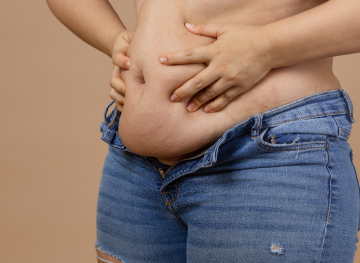

Free Delivery | Same day delivery in select cities
"Don't eat too much ghee, it's just fat. You'll get fat"
If we had a dollar every time we heard that, well, we would be a decacorn.
Truth is, you will get fat with pretty much anything if you eat too much of it. Yes, we know what you're thinking, is it really possible to stay skinny by just eating pizza? Well, yes, but pizza isn't the most nutritious food available. So are all the fat-loss foods just gimmicks? Let’s find out.
Let's talk about fat. Does fat make you fat? If yes, how much fat should one consume per day? If no, why has our whole life been a lie? What is real even?
First things first, let's understand what fat is. Fats are nutrients that provide energy and help with the absorption of Vitamins. They make up an important constituent of your daily nutrition. When you eat fats, your body has two choices: either burn them as energy or store it as body fat. So when does your body store it as body fat? Only when you overeat with fat as your main calories. There are 4 major types of dietary fats, namely:
• Saturated fats
• Transfats
• Monounsaturated fats
• Polyunsaturated fats
Let's talk about them briefly:
A) Saturated fats - These are found in animal-based foods like meats, butter, and also palm oil (which is found in packaged biscuits/pastries). A general rule of thumb is to consume less than 10% of your calories from saturated fats as they tend to drive up harmful LDL cholesterol.
B) Transfats - Most transfats are made in industrial processes. Pretty much tasty junk food has transfats in it. While they definitely taste good, they're not so good on your health. They are directly responsible for raising your LDL cholesterol, leaving you exposed to diseases like stroke, heart attack, etc. Yes, we know, we're heartbroken too. But, hey, let's not get into the trap of going cold turkey. You can consider eating these foods at a small scale to satisfy your cravings. Aim to have a better relationship with food. Aim to have a balanced diet.
C) Monounsaturated fats - Found in foods like olive oil, avocado, and nuts. These fats are good for you. Not only do these fats reduce bad cholesterol but also provide important nutrients to help develop and maintain your body’s cells.
D) Polyunsaturated fats - Found in fish and walnuts. Similar to monounsaturated fats, they also help reduce bad cholesterol and help provide the right nutrition to your body which helps it develop and maintain cell function.
To summarize, try to avoid transfats as much as you can, have less of saturated fats and healthy levels of monounsaturated and polyunsaturated fats.
Thanks to modern advertising, many times we end up falling to gimmicks such as low-fat products/slimming shakes. Truth is, fats are not necessarily the evil they're portrayed to be, some fats are bad for you, some fats are really good for you. Just because a biscuit is low-fat, doesn't make it totally okay to binge. And, you can totally gain weight from eating large amounts of low-fat crisps. The bottom line is, you only gain weight when you surpass your total daily caloric intake.
Now let's look at what science has to say.
A trial of 12 months was conducted called DIETFITS, it found that a healthy low carb diet and healthy low-fat diet produced similar weight loss results.
In fact, multiple studies comparing low-fat and low-carb diets also produced a very similar result. So it is safe to say that, in the long run, both of these diets work with respect to losing weight because you are reducing your overall caloric intake. What’s interesting is that, when you consume fewer carbs and fats, you rely more on protein. And it is hard for your body to convert protein into stored fat. Usually, protein is burnt off in the form of energy. Plus, protein happens to be more satiating than carbs/fats, which means you’re not left feeling lethargic the whole day.
So what have we learnt?
• Not all fats are evil.
• Consume good fats in healthy amounts whenever possible.
• Consume bad fats in moderation.
• And if you wanna lose weight, control your total caloric intake first.
• Don’t fall for “quick fat loss” gimmicks.
And if there’s a final takeaway from this article, it would be this: Aim to have a better relationship with food. Think sustainable. If you’re eating healthy foods 80% of the time, it won’t even matter what you’re eating for the rest as long as you’re eating in moderation/small scale. That way, you’re taking care of your body and still having fun. And if you want to lose or even gain weight, start tracking your calories. It's easier to progress when you are tracking. You could also consider our newest product, "All-In-One" nutrition. While we definitely urge you to nutrient dense meals, it can get a bit inconvenient to calculate the exact calories because of many variables. By consuming Happy Ratio, you're removing yourself from all the guess work because we've already put the numbers. In the front of the pack. Happy Ratio is anywhere between 150-400 calories (depending on your serving size) and is the most nutritious supplement in the Indian market today. You get all the 39 essential nutrients that cater to every single health benefit.
To grab your Happy Ratio "All-In-One" Nutrition health shakes click here. You can avail our existing offers by using code HAPPYJUNE for a Buy 2 Get 1 Free or code TRYITALL10 to get one Try-It-All Sampler Pack absolutely free with the purchase of any one product of your choice.
Source: Examine.com